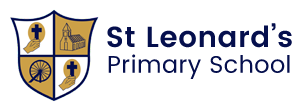In this section of the website, you will find information about our approach to teaching Religious Education (RE) at St Leonard’s. RE is a mandatory subject and is taught as a discrete lesson and through other subjects. Parents and carers have the right to withdraw their child from all or part of the RE curriculum – please contact the headteacher to discuss this further.
RE is the foundation of the entire education process and permeates all areas of the curriculum and school life. We are a Catholic school and we are committed to the Catholic Faith, recognising and valuing every individual as special and unique and giving everyone the opportunity to ”learn, grow and shine”. With Jesus in our hearts, we encourage love and respect for all. We are nurturing every child through an engaging curriculum that is centred around our Gospel Values. Religious Education at St. Leonard’s respects and promotes each child’s capacity for wonder, reverence and spirituality. Children are taught about God’s love; they learn about their Christian responsibilities; children are provided with experiences of church, Catholic and Christian traditions, as well as being taught to be respectful and understanding of people and traditions from other faith backgrounds. Through Religious Education our children learn about their unique place within the home, school and parish community. Our principal aim is that children leave St Leonard’s they will have met the attainment targets in the RE programme of study and are happy and confident in their place in the community and have a clear understanding on their impact in it. At St. Leonard’s we follow the ‘Come and See’ Religious Education Scheme of Work in line with guidance from the Diocese of Hexham and Newcastle. This programme is followed throughout school from Reception to Year 6. This programme provides: ‘Come and See’ is an invitation to exploration and a promise of life for everyone. The invitation is open to all. In response to the question; ‘where do you live?’ which was asked by the disciples, Jesus invited them to; ‘Come and See.’ (John 1:39) The disciples went with Jesus ‘and spent the rest of that day with him.’ Central to the programme are three basic human questions and the three Christian beliefs that are the Church’s response in faith. Where do I come from? Life – Creation Who am I? Dignity – Incarnation Why am I here? Purpose – Redemption In Come and See these big questions are considered in the light of the Scriptures and Tradition of the Church, as expressed in the documents of the Second Vatican Council and the Catechism of the Catholic Church. Come and See is developed through three themes based on the above documents of the Second Vatican Council, which are gradually explored each time at greater depths. They are Church, Sacrament and Christian living. The Catechism of the Catholic Church addresses the human search for meaning, God’s initiative in Revelation who comes to meet us and our response of faith. The process for delivering the topics in ‘Come and See’ has three stages – Explore, Reveal and Respond which enable the pupils with the development of knowledge, understanding, skills and the fostering of attitudes. 10% of teaching time is dedicated to the teaching of RE. Explore (1 week) – The teacher helps the children to begin to look at and focus on the experience within their own lives – concerning themselves, their relationships and their world. In this way the children are led to a deeper understanding, clearer vision and the discovery of significance and value of the experiential events of everyday life. Reveal (usually 2 weeks) – Reveal is the heart of the process. The teacher and the children together discover the Christian understanding of the mystery of the Trinity; Father, Son and Holy Spirit. They explore the mystery of human life as revealed in the person, life and gospel of Jesus Christ Christians. It will involve learning about Scripture, the teaching of the Church, prayers, rites, psalms, hymns and other expressions of Christian faith and the lives of outstanding Christians. Respond (1 week) – Remember is the first part of this section. The children will respond by remembering and celebrating all that they have learnt. Rejoice is the second part of the section. There will be the opportunity to plan and take part in a celebration. Renew the teacher helps each child to make an individual response, to hold on to and make their own, what they have understood of the topic. As part of the ‘Come and See’ R.E. programme all children will study for two weeks of the year, Judaism and Islam. This enables the children to have an understanding of what life is like for a child of another faith by the time they leave us. Ongoing informal assessment against the Age-Related Standards are used to inform planning and to identify areas for focus and support. Assessment is moderated internally and externally within coordinator meetings. Through the complete and rigorous Religious Education at St Leonard’s, children are given the opportunity to ‘learn, grow and shine’ in the image and likeness of God. They talk openly and deeply about their faith and reflect this in their everyday life. They show this learning through questioning, reflective responses, respect for all and treating others as God would want them too. Children are happy and confident in their place in the community and have a clear understanding on their impact in it. This is reflected in the positive impact they have through their responses to charitable work, their contributions to the liturgy of the school and the parish, and in the reflective work they produce in their RE books. The children leave St Leonard’s knowing that they have a purpose in the world and a responsibility towards one another.
Other Faiths
Assessment


